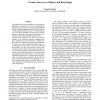Free Online Productivity Tools
i2Speak
i2Symbol
i2OCR
iTex2Img
iWeb2Print
iWeb2Shot
i2Type
iPdf2Split
iPdf2Merge
i2Bopomofo
i2Arabic
i2Style
i2Image
i2PDF
iLatex2Rtf
Sci2ools
155
click to vote
AI
2016
Springer
2016
Springer
Certain answers as objects and knowledge
The standard way of answering queries over incomplete databases is to compute certain answers, defined as the intersection of query answers on all complete databases that the incomplete database represents. But is this universally accepted definition correct? We argue that this “one-size-fits-all” definition can often lead to counterintuitive or just plain wrong results, and propose an alternative framework for defining certain answers. The idea of the framework is to move away from the standard, in the database literature, assumption that query results be given in the form of a database object, and to allow instead two alternative representations of answers: as objects defining all other answers, or as knowledge we can deduce with certainty about all such answers. We show that the latter is often easier to achieve than the former, that in general certain answers need not be defined as intersection, and may well contain missing information in them. We also show that with a ...
Related Content
| Added | 29 Mar 2016 |
| Updated | 29 Mar 2016 |
| Type | Journal |
| Year | 2016 |
| Where | AI |
| Authors | Leonid Libkin |
Comments (0)

